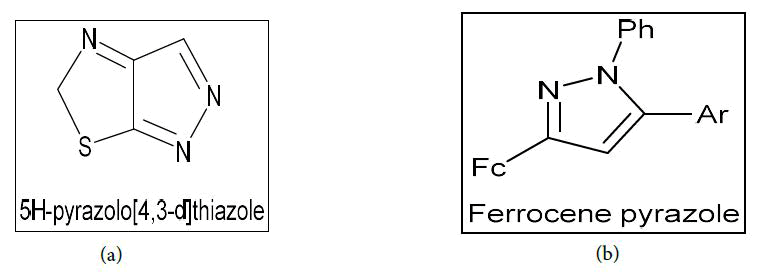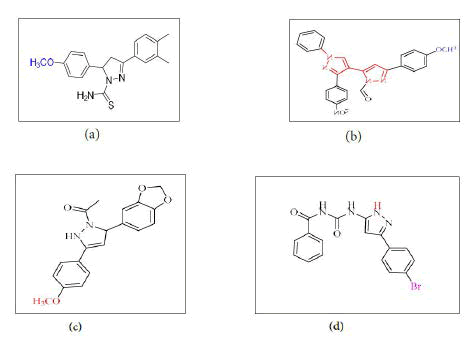Short Communication - (2023) Volume 13, Issue 3
Received: 11-Jan-2023, Manuscript No. MCCR-23-86690;
Editor assigned: 13-Jan-2023, Pre QC No. MCCR-23-86690 (PQ);
Reviewed: 27-Jan-2023, QC No. MCCR-23-86690;
Revised: 25-Apr-2023, Manuscript No. MCCR-23-86690 (R);
Published:
03-May-2023
, DOI: 10.37421/2161-0444.2023.13.669
Citation: Gautam, Amit Kumar. "Synthesis
and Biological Activities of Novel Pyrazole Derivatives in
the Management of Cancer." Med Chem 13 (2023): 669.
Copyright: © 2023 Gautam AK. This is an open-access article distributed under the terms of the creative commons attribution license which permits unrestricted
use, distribution and reproduction in any medium, provided the original author and source are credited.
Cancer is a perplexing and frightening illness. It is the second leading global cause of death. Five new pyrazole compounds were created, and their anti-proliferative effects on people were investigated. The active site of a family of kinase enzymes has been found to be inhibited by the pyrazole analogues. Include CDK (Cyclin-Dependent Kinase). A family of serine threonine protein kinases known as CDKs aid in the beginning, continuation, and end of cell cycle events. Pyrazole derivatives ability to stop the growth of endothelial cells the endothelial cell growth is inhibited by hydroxypyrazolocarboxaldehyde. The proliferation of tumor cells is inhibited by new pyrazoles, although hydroxypyrazoloquinolin-4 exhibits superior action in this regard.
Frightening illness • Pyrazole • Aromatic heterocyclic ring • Endothelial cells • Tumor cells
Aromatic heterocyclic ring with five members and two nearby nitrogen atoms CH3N2H is the molecular formula [1-3]. Houttuynia cordata produced the first pyrazole to be isolated from natural sources, 3-n-nonyl-1H-pyrazole. It has a PCB of 11.5 and a conjugated acid pKa of 2.49 at 25ºC, making it a weak base. Ludwig Knorr initially used the term "pyrazole" in 1883. They fall under the category of alkaloids because of their chemical make up and distinctive pharmacological effects on humans. The first naturally occurring pyrazole was 1-pyrazolyl-alanine, which was discovered in watermelon seeds in 1959 [4].
Structure of pyrazole
Aromatic heterocyclic ring with five members and two nearby nitrogen atoms CH3N2H is the molecular formula. Houttuynia cordata produced the first pyrazole to be isolated from natural sources, 3-nnonyl-1H-pyrazole (Figures 1 and 2) [5].
Structure-activity relationship of pyrazole derivatives as an anticancer agent

a) In this compound the methoxy group on phenyl ring produced more potent inhibitory action against epidermal growth factor.
b) In this compound the methoxy group and combination of two pyrozole rings together showed strong activity against nonsmall lang cancer.
c) When EDG have attached at position 4 then it showed better telomerase inhibitary activity than EDG. d) When the br have an added and pyrazole-NH group to form hydrogen bond which showed high anti-tumor activity.
Synthesis of polysubstituted pyrazole from 1,3-dicarbonyl compounds
• This is a classical method for the synthesis of pyrazole, like knorr pyrazole synthesis.
• It is a rapid approach to obtaining polysubstituted pyrazoles (Figures 3 and 4) [6,7].
Mechanism of available anticancer agents
Mechanism of action of novel pyrazole derivatives
• It has been discovered that the pyrazole analogs block the active site of a family of kinase enzymes. Include CDK (Cyclin-Dependent Kinase).
• The CDK family of serine threonine protein kinases aids in the beginning, continuation, and end of cell cycle events (Figures 5-8) [8].
Synthesis of novel pyrazole compounds
Biological activities of novel pyrazole derivatives
• Inhibition pyrazole derivatives inhibit the growth of endothelial cells of the three, hydroxypyrazolo carboxaldehyde 4d was more potent than 4a, which did not suppress endothelial cell growth.
• New pyrazoles inhibit endothelial cell migration [9].
• The 4d markedly impeded wound healing. The activity of hydroxypyrazoloquinolin-4-one. 8b, however, was superior. Reduction in the growth of malignant cells (Table 1 and Figure 9).
| Aldehydes | 4a | 4b | 4c | 4d | 4e |
|---|---|---|---|---|---|
| IC50 | >100 | 42 | 44 | 12 | 43 |
| Close rings | 8a | 8b | 8c | ||
| IC50 | 7 | 25 | 42 | ||
| Esters | 10a | 10b | 10c | 10d | 10e |
| IC50 | 29 | 14 | 25 | 6.2 | 12 |
Table 1. Biological activities of novel pyrazole derivatives.
Overview of current progress made in using pyrazole derivatives as anticancer agents in various cell lines

a) The pyrazole moiety fused with thiazole heterocyclic compound. This derivative inhibits protein kinase for treating cancer.
b) The anti-proliferative effect of this compound was evaluated in breast cancer cell line [10].
• Pyrazole is a two nitrogen molecule with a heterocyclic five
membered structure that is used in a wide range of
pharmacological processes.
• The creation of bioactive compounds incorporating heterocyclic
pyrazoles has garnered increasing attention in the modern era. A
fascinating moiety to use in the synthesis of pyrazole's many
derivatives for a variety of biological functions.
• In addition, the pyrazolole moiety blocks the activity of several
growth factors and members of the kinase enzyme family,
including Cyclin-Dependent Kinase (CDK). The most potent
inhibitory activity of pyrazole against various cell lines, including
non-small lung cancer, renal cancer, etc., has been demonstrated
by a variety of unique pyrazole derivatives that have been
produced.
• There is a tonne of research being done on the pyrazole moiety
to create new cancer fighting medications.
[Crossref] [Google Scholar] [PubMed]
[Crossref] [Google Scholar] [PubMed]
[Crossref] [Google Scholar] [PubMed]
[Crossref] [Google Scholar] [PubMed]
[Crossref] [Google Scholar] [PubMed]
Medicinal Chemistry received 6627 citations as per Google Scholar report